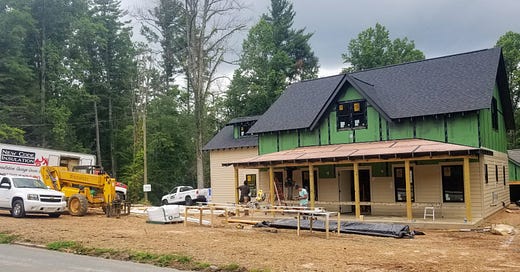“Flag Lots” Discussion Flagged Before It Starts
A Brevard Planning Board member is denied the right to present his argument that plans for a small subdivision violate city rules, after Board of Adjustment finds he lacks "standing."
By Dan DeWitt
BREVARD — Brevard Planning Board member Greg Hunter carried a sheaf of papers into Tuesday’s meeting of the city’s Board of Adjustment, ready to press his case that plans for a six-lot subdivision on West Probart Street were approved in violation of rules covering irregular parcels called “flag lots.”
City Planning Director Paul Ray had said — in polite, professional terms — bring it on.
“There’s no hardship for us in explaining why we did something,” he said last week.
But the Board of Adjustment decided it couldn’t happen.
After hearing from its attorney, Brian Gulden, and City Attorney, Mack McKeller, the board found that Hunter did not have standing to press his case.
“Mr. Hunter, you may have a seat,” the board’s chair Judith Mathews told him after the unanimous vote.
“Sure,” he said. “Thanks for listening.”
The board had listened not to his case, but to his argument that he had the legal right to present it at the quasi-judicial hearing.
Hunter, a member of the Planning Board, filed the appeal of the six-home subdivision on Probart Street in May, after studying the plat and determining it violated the rules regulating flag lots, he said last week. These lots are so called because the large, often rectangular portion resembles a flag, and the narrow strip that connects it to a nearby road looks like its pole.
Hunter had also said that Ray did not offer an adequate explanation of why the subdivision had been approved.
Ray countered last week that he did explain his department’s decision, which was based on, among other factors, a determination that the lots were not flag lots because the pole portion was too wide.
McKeller argued on Tuesday that Hunter had every right to file the appeal, which Ray had said was the first one from a planning board member in his six years at the city. But before Hunter could actually present his argument, McKeller said, he had to prove he had standing.
That position is open to any “aggrieved (party), or by an officer, department, or board of the city,” Hunter said, quoting from the city’s website. But on questioning from Gulden, Hunter acknowledged that though he is a member of the Planning Board, he wasn’t speaking for it.
Hunter also said that, as a resident of Probart, he would be impacted by the subdivision's traffic.
That’s not enough, Gulden said. Hunter had to prove “special damages distinct from the rest of the community, based on depreciation of the value of your property, based on certain elements whether it be air, light, noise, traffic, glare,” he said.
McKeller moved for the dismissal that was granted unanimously. McKeller made other arguments, including that Hunter had missed a required 30-day window for filing his appeal and that a new state statute suggested such appeals should be heard in Superior Court.
“This is not to say the issue brought up on appeal is not important for the city to discuss,” McKeller said. “It’s to say this is not the right place to do that.”
Immediately after the hearing, Ray and Hunter worked out a different place — not to discuss the subdivision on Probart, Ray said, but the law covering flag lots, which is “woefully inadequate.”
Ray said he would schedule a discussion to clarify these rules at the Planning Board’s Oct. 26 meeting.
Hunter accepted the decision, though he was disappointed not to be able to press what he said is a strong case. He said he never wanted to halt the Probart development, just to ensure that city staffers were following rules and that decisions were discussed openly.
“Ultimately, I hope something constructive does come out of this,” he said. “That’s where I was wanting this to go.”




